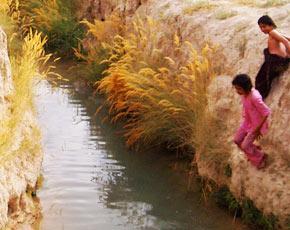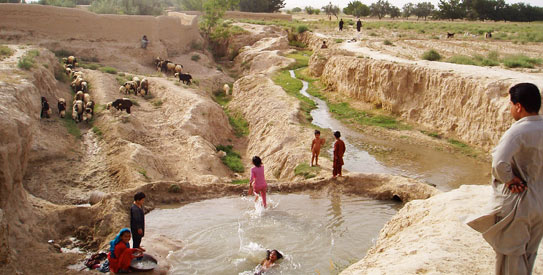
This is the first part of a two-part series on Balochistan’s karez irrigation system.
Popular Pakistani landscape esthetics run in favour of rolling green hills and snow capped mountains. Your scribe, however, has a predilection for rugged arid landscapes. Being a deserts fan, particularly upland deserts, two of my favorite places in the world are the canyon country of Utah and Arizona in the Western United States and then Balochistan.
I firmly believe that if God had a summer home in this world it would to be either in Utah or Balochistan. The vast open spaces and majestic topography of Balochistan is a tonic for tired spirits. And it was the lure of these spaces and beautiful people living therein that led me to Balochistan to undertake a National Geographic funded research on the karez irrigation system there.
Karez is a human-made underground channel that passively taps the groundwater, conveys it by gravity through that channel to villages at the valley floor, where it becomes their lifeblood. These structures are found all over West Asia, Central Asia, North Africa, Spain and even as far as Peru, Mexico and Japan.

Karezes are not just irrigation structures, as I found out; they are in fact the bond that holds the social, economic and cultural life of the communities. Balochistan is one place in South Asia perhaps, where if you ask somebody how much land they have, they would generally have no idea. Land is infinite in Balochistan. It is water that matters in that arid realm. People’s social station is not determined by their landholdings in Balochistan but by the size of their share of water in a karez.
Karez water is perpetually flowing and that water is divided into 24 hour cycles called Shabanas. A karez, depending upon its size may have anywhere from 18 to 32 shabanas divided up between the karez shareholders, with individual rights ranging from a few minutes of water right to a week of water.

But, even if one has a few minutes of water right in a karez, a shareholder (shareeq, plural shuraqa) gets to have the standing of a country gentleman in the community and gets to sit in a jirga and weigh in on collective decisions.
Karez is an incredibly equitable system between upstream and downstream users. A water user who has the first parcel of land along a karez water course, also has the last parcel of land on that channel. The one with the second parcel of land also has the second to last parcel of land and so forth. This ensures that everybody in the community has an equal stake in maintaining the entire water course, unlike in Punjab where the upstream water users invariably make out like bandits at the expense of the downstream water users.
For the past 30 years the government along with assorted donors have been promoting tubewells in an effort to modernise the agricultural sector. Tubewell water is on demand and it is — well — modern. With subsidised tubewells and electricity to run them, there is a serious issue with groundwater mining in Balochistan, where groundwater is dropping at alarming rates in Quetta, Mastung and Pishin districts for example. But beyond the imminent environmental catastrophe that awaits Balochistan, are the social consequences of this state sponsored blind rush towards modern tubewells. With the dropping of the water table, with every tubewell dozens of karezes go dry. As one of my research respondents said:
"But a tubewell is owned by an individual from which two or three people are earning their living, a karez however, is communally owned from which 500-1000 people may be earning their living. So you figure out that when a tubewell gives an individual benefit, how many lose out."

The ones who lose out, which is the majority of the poor, don’t just lose their livelihood but also their sense of pride and dignity. While the routine karez management and maintenance procedures kept the rural communities bound in strong bonds of social capital, with the drying of the karez those bonds are strained. Where one was a country gentleman, even if of modest means in a karez system, he is reduced to being a day laborer, or worse a street hawker in the slums of Quetta and Karachi. No prizes for guessing what the young people get in such circumstances.
Knowing what I know about karezes I am convinced that helping the people of Balochistan save karezes from extinction, will be one of the keys to restoring peace and dignity to the rural poor of Balochistan. With only groundwater to go on, its depletion, as is going on right now, will spell doom for that province — socially and environmentally.
But there is hope and I will talk about that in my next column.

The views expressed by this blogger and in the following reader comments do not necessarily reflect the views and policies of the Dawn Media Group.













































